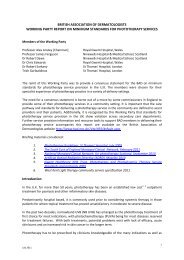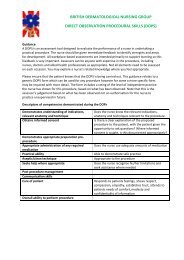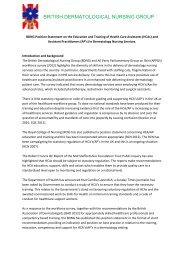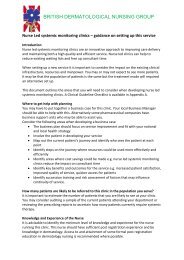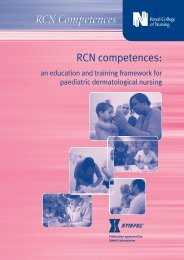Improving outcomes for people with skin tumours including melanoma
Improving outcomes for people with skin tumours including melanoma
Improving outcomes for people with skin tumours including melanoma
Create successful ePaper yourself
Turn your PDF publications into a flip-book with our unique Google optimized e-Paper software.
B. Anticipated benefits<br />
Better-quality diagnosis and treatment by trained and audited<br />
personnel should result in better <strong>outcomes</strong> <strong>for</strong> patients.<br />
The benefits of giving patients adequate in<strong>for</strong>mation, breaking bad<br />
news sensitively, and providing support at the crucial time of<br />
diagnosis are well documented. These issues are further discussed in<br />
the ‘Patient-centred care’ chapter and in the NICE guidance<br />
<strong>Improving</strong> supportive and palliative care <strong>for</strong> adults <strong>with</strong> cancer. 53<br />
<strong>Improving</strong> Outcomes <strong>for</strong><br />
People <strong>with</strong> Skin Tumours<br />
<strong>including</strong> Melanoma<br />
Initial investigation,<br />
diagnosis, staging and<br />
management<br />
There will be greater accuracy in reporting of MM.<br />
Adjuvant therapy will predominantly be per<strong>for</strong>med in the context of<br />
clinical trials in order to increase knowledge of the efficacy of<br />
treatments.<br />
SNB will only be per<strong>for</strong>med in centres <strong>with</strong> expertise in the context<br />
of clinical trials, thereby ensuring that the technique will be properly<br />
evaluated.<br />
4<br />
Increased access <strong>for</strong> Mohs surgery will improve <strong>outcomes</strong> <strong>for</strong> some<br />
patients.<br />
C. Evidence<br />
Pathological diagnosis<br />
There is evidence from observational studies indicating that not all<br />
tissue samples are sent <strong>for</strong> pathology reporting.<br />
There is evidence from observational studies that there are<br />
discrepancies between general pathologists and specialist<br />
dermatopathologists and specialists in pigmented lesion pathology in<br />
the reporting of <strong>melanoma</strong>s and other pigmented <strong>skin</strong> lesions.<br />
Observational studies provide evidence that histopathological<br />
examination has high sensitivity and specificity <strong>for</strong> <strong>melanoma</strong>. These<br />
studies also report difficulty <strong>with</strong> diagnostic accuracy and consistency<br />
<strong>for</strong> melanocytic lesions that are considered borderline <strong>for</strong> malignancy.<br />
Other lesions that are reported as presenting difficulty <strong>for</strong><br />
pathological diagnosis include childhood <strong>melanoma</strong>, atypical naevi<br />
and Spitz naevi.<br />
53 National Institute <strong>for</strong> Clinical Excellence (2004) <strong>Improving</strong> supportive and palliative care<br />
<strong>for</strong> adults <strong>with</strong> cancer. Available from: www.nice.org.uk<br />
Guidance on cancer services: <strong>skin</strong> <strong>tumours</strong> <strong>including</strong> <strong>melanoma</strong> 89




